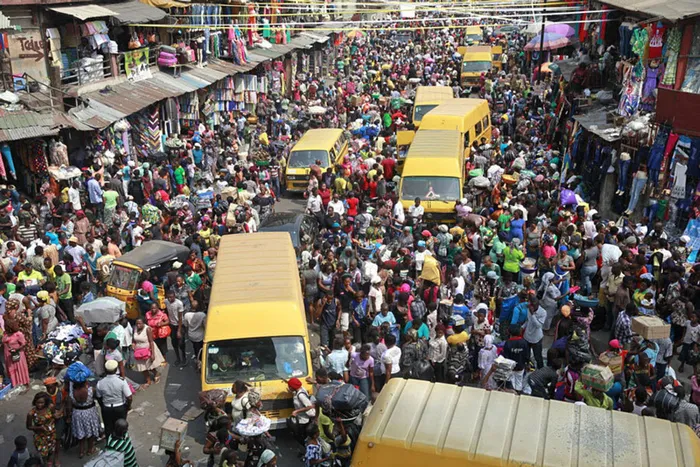Why Africa is less democratic and safe than a decade ago

File Picture: Akintunde Akinleye/Reuters/The Christian Science Monitor - People gather at Balogun Market in Central Lagos, Nigeria.
By Ishaan Tharoor
A new study of Africa's 54 countries provides grim reading. It found that much of the continent is less safe and less democratic than it was a decade ago, a marker of worrying political trends that accelerated over the course of the pandemic. A surge in military coups and the spread of armed conflicts now threaten to stall, and even reverse, years of political progress across the region.
The index, which is put out every two years by the Mo Ibrahim Foundation, compiles a ranking of quality of overall governance across Africa based on scores allocated to a range of criteria, including development, economic opportunity and political inclusion. According to the analysis, its subcategories measuring democratic participation and "security and rule of law" both deteriorated, with the "pace of decline accelerating since 2017." An estimated 70 percent of the continent's population lives in countries that the index classifies as less safe now than in 2012.
The report pointed to 23 successful or attempted coups since 2012, and eight takeovers by juntas since 2019. Mali and Burkina Faso, two West African neighbors once known for their relative political stability, have recently experienced two coups each. "This phenomenon of coup d'etats that was common in the '80s seems to have become fashionable again in certain parts of Africa," Mo Ibrahim, a Sudanese-born British billionaire who has used his wealth to promote democracy and good governance in Africa, told reporters this week.
A decade and a half ago, Ibrahim established an annual prize in his name to be awarded to a democratically elected, former African leader who championed good governance, the rule of law and set an example for leadership to the wider region. The prize came with a hefty $5 million reward, an incentive, it seemed, for the continent's politicians to care about their legacies. But for the majority of the years since the prize was first announced, Ibrahim's foundation has chosen not to award it.
Analysts and experts have fretted about democratic decline in Africa for years. The end of the Cold War precipitated a wave of democratization across the continent. According to the rankings of Freedom House, a Washington-based think tank, two-thirds of African states were classified as "not free" in 1989. In 2009, two-thirds were considered "free" or "partly free."
The positive trends did not continue over the past decade, as a host of governments hid behind the fig leaf of electoral democracy even as they consolidated a more autocratic grip. A 2021 report submitted to the European Parliament attempted to map out why: "Two sets of reasons account for the fragility of democracies in sub-Saharan Africa. ... The first include low socio-economic development, conflict and insecurity; the second include weak institutions, lack of judicial independence, manipulation of electoral laws and constitutional norms, as well as serious limitations of civil and political rights."
"In practice, authoritarian regimes have become skilled at using a facade of legality to legitimize their grip on power," the report adds.
Then came the pandemic, which, as the Mo Ibrahim Foundation noted, led to "a worrying trend of state-backed violence" along with accelerated rates of violence against civilians and armed conflict. Insurgencies and wars metastasized from the Sahel to the Horn of Africa, as well as in regions further south. Where there were not deepening conflicts, there were deepening autocratic regimes.
"Even before the pandemic, an increasing number of African heads of state had moved to undermine term limits or rig elections to remain in power," observed the Council of Foreign Relations, one year into the pandemic. "But COVID-19 has given them greater leverage, providing further pretext for postponing elections in Somalia and Ethiopia, muzzling opposition figures in Uganda and Tanzania, and imposing restrictions on media across the continent."
On top of that, the enforcement of pandemic restrictions was often brutal, giving rise to demonstrations in countries including Kenya and South Africa, it adds.
Nevertheless, the desire for greater democracy and stronger government is widespread in Africa, as recent polling indicates. "The public's democratic commitment is undergirded by strong and in some cases growing support for core democratic institutions," noted British think tank Chatham House last August. "Support for multiparty competition and parliamentary oversight of leaders remains steady, while expectations that governments should be accountable to the courts have increased significantly over the past decade."
According to the Mo Ibrahim Foundation's analysis, there have been marked improvements in other continental indicators, including advances in health and education, equality for women and infrastructure for development. But it can't evade a troubled global moment, where democracy is in decline elsewhere, where climate change wreaks havoc in the world's poorest and most vulnerable communities, and where the vicissitudes of the pandemic have exposed the ailing, debt-ridden economies of the developing world.
"We did not cause climate change, but we are hit by it," Ibrahim told Reuters in an interview. "We did not start the war in Ukraine, but we're hit by that. We did not start Covid, but we get hit by that. Then we have bad governance. We're responsible for it."
- Tharoor is a columnist on the foreign desk of The Washington Post. This article was first published in The Washington Post.